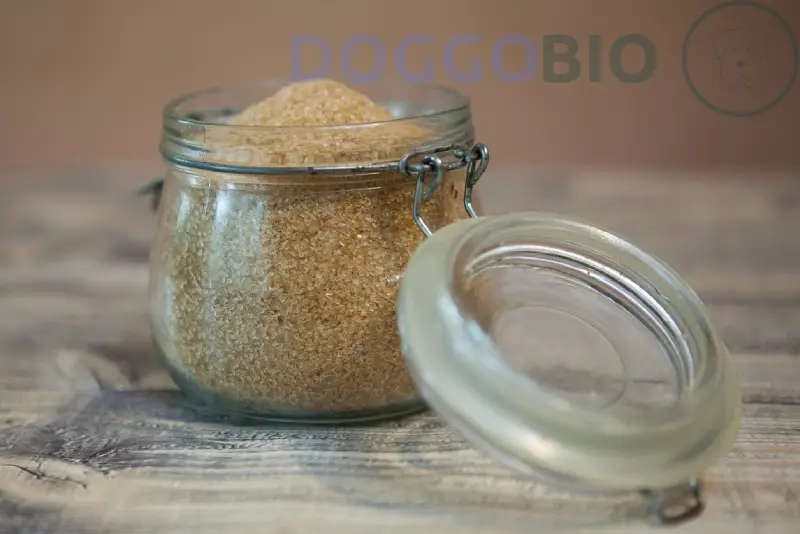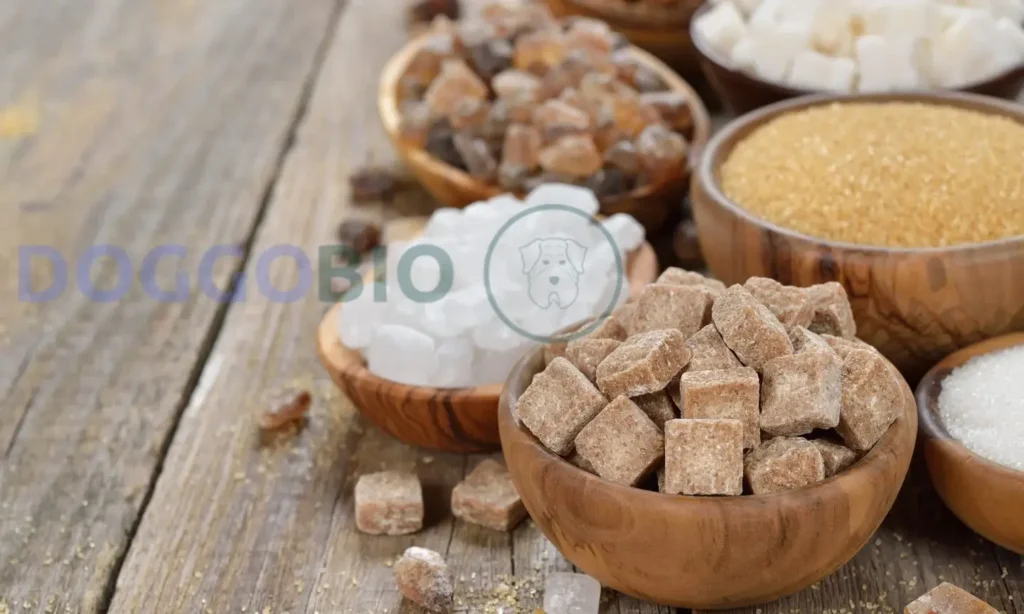As dog owners, it’s natural to wonder about the foods we share with our furry companions. One common question revolves around the use of brown sugar. The sweet, rich flavor of brown sugar adds a delightful touch to our baked goods and beverages, but can dogs have brown sugar? The answer is straightforward: no. While our four-legged friends undoubtedly bring sweetness into our lives, brown sugar is not a safe or suitable addition to their diet.
In this article, we’ll explore why brown sugar is off-limits for dogs and provide alternatives when you want to treat your canine companion to something special.
Can Dogs Have Brown Sugar?

No, it’s not recommended. While not toxic, brown sugar can lead to health complications if consumed regularly.
Both brown and white sugars are essentially sucrose and can cause digestive issues like diarrhea and vomiting in dogs. Long-term consumption can contribute to obesity, diabetes, and even pancreatitis.
It’s crucial to understand that dogs do not require carbohydrates, straightforward sugars, in their diet.
The Nutritional Value Of Brown Sugar

The Effects of Brown Sugar on Dogs
Now that we understand brown sugar better, let’s discuss its effects on dogs.
Dogs can also experience a sugar rush when consuming sugary treats like humans. This is because sugar is quickly absorbed into the bloodstream, causing a spike in energy levels.
However, unlike humans, dogs do not have the same ability to regulate their blood sugar levels, which can lead to potential health issues.
- One of the main concerns with feeding brown sugar to dogs is the risk of obesity. As mentioned earlier, brown sugar is high in calories and offers no nutritional benefits. If consumed regularly, it can contribute to weight gain and obesity in dogs, which can lead to various health problems such as diabetes, joint issues, and heart disease.
- Another potential effect of brown sugar on dogs is dental problems. Unlike humans, dogs can also develop cavities and tooth decay from consuming too much sugar. The bacteria in a dog’s mouth feed on the sugar, producing acid that can erode the enamel and cause tooth decay. This can result in painful and expensive dental procedures for your furry friend.
Risks of Feeding Brown Sugar to Dogs
Apart from the effects mentioned above, some risks are associated with feeding brown sugar to dogs.
- One of the main concerns is the risk of hypoglycemia, which is a sudden drop in blood sugar levels. This can occur if a dog consumes a large amount of sugar at once, causing a spike in insulin production. Hypoglycemia can be life-threatening and may require immediate medical attention.
- Moreover, brown sugar can also pose a choking hazard for dogs. The granules can get stuck in their throat or cause blockages in their digestive system, leading to serious health issues. This is especially true for smaller breeds with difficulty chewing and digesting sugary treats.
To summarize, while small amounts of brown sugar may not cause any immediate harm to dogs, regular consumption can lead to various health issues and risks.
It is best to avoid giving your furry friend any sugary treats, including brown sugar, to ensure their overall well-being.
Alternatives To Brown Sugar For Dogs
Now that we know the potential effects and risks of feeding brown sugar to dogs, you may be wondering what alternatives are safe for your furry friend. Here are some healthier options that you can consider:

1.Honey
Honey is a natural sweetener that contains antioxidants and has antibacterial properties. It is also easier for dogs to digest compared to sugar. However, it is essential to note that honey is still high in calories and should be given in moderation.
2.Fruits
Fruits such as apples, bananas, and berries can be a great alternative to sugary treats for dogs. They are naturally sweet and contain essential nutrients and fiber. Just remove any seeds or pits before giving them to your dog.
3.Carrots
Carrots are low in calories and fiber, making them a healthy dog snack. They also contain beta-carotene, which promotes good eye health. You can give your furry friend raw or cooked carrots as an occasional treat.
4.Homemade Dog Treats
Make homemade dog treats to ensure your dog consumes only safe and healthy ingredients. Many online recipes use natural sweeteners like applesauce, pumpkin puree, and mashed bananas instead of sugar.
Frequently Asked Questions
Can Brown Sugar Cause Diabetes In Dogs?
While there is no direct link between brown sugar and diabetes in dogs, regular consumption of sugary treats can contribute to weight gain and obesity, which are risk factors for developing diabetes.
Can Dogs Have Molasses?
Molasses, the main ingredient in brown sugar, is not toxic to dogs. However, it is high in sugar and should be given in moderation.
Are There Any Benefits Of Feeding Brown Sugar To Dogs?
No, there are no significant benefits of feeding brown sugar to dogs. It is best to avoid giving your furry friend any sugary treats to maintain their overall health and well-being.
Can Dogs Eat Oatmeal With Brown Sugar?
No, dogs should not eat oatmeal with brown sugar. While oatmeal can be a healthy part of a dog’s diet in moderation, adding brown sugar increases the risk of health issues related to sugar consumption.
Can Dogs Eat Brown Sugar Cinnamon Pop Tarts?
Dogs should avoid Brown Sugar Cinnamon Pop Tarts. These are high in sugar and offer no nutritional value to dogs, posing risks of obesity, dental issues, and other sugar-related health problems.
Can Dogs Eat Sweet Potatoes With Brown Sugar?
While sweet potatoes alone can be nutritious for dogs, adding brown sugar negates these benefits. The added sugar can lead to health issues and should be avoided in a dog’s diet.
Conclusion
In conclusion, when it comes to the question, “Can Dogs Have Brown Sugar?” the answer is a resounding “no.” Brown sugar poses significant health risks to dogs, including obesity, dental problems, and potential toxicity.
As responsible pet owners, it’s crucial to prioritize our furry friends’ well-being by avoiding this harmful ingredient and opting for safe alternatives. We can help ensure our dogs lead healthy, happy lives by making informed dietary choices.
